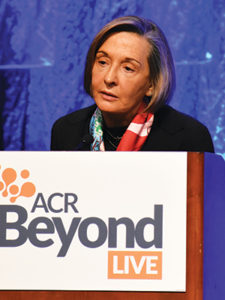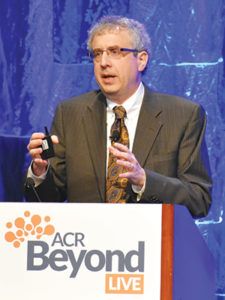
One of the studies presented during Sunday morning’s Year in Review session highlighted work by investigators from the University of Toulouse in France that provides new insight into gender bias, which is seen in many autoimmune diseases.
The popular session featured summaries of some of the most important publications over the past year in both basic and clinical research and the clinical practice of rheumatology.
Maria Virginia Pascual, MD, Director of the Drukier Institute for Children’s Health and Ronay Menschel Professor of Pediatrics at Weill Cornell Medical College in New York, discussed the study from Toulouse as part of her review of several basic science studies offering new and updated insights into the mechanisms and pathophysiology of autoimmunity and rheumatic disease.
“Women have two X chromosomes and there are some very fundamental genes encoded within the X chromosome that can affect autoimmunity. TLR7, a receptor for RNA, is one of them,” Dr. Pascual said. “The dogma has been forever that in women who carry the two X chromosomes, one X chromosome is inactivated in cells; however, what this group is now elucidating is that this actually doesn’t happen all the time in women.”
Among their findings, the researchers reported increased TLR7 transcripts in biallelic naive B cells and enhanced expression of TLR7 protein in PBMCs from women.
“More importantly, they also showed that when they activate B lymphocytes in a TLR7 dependent manner, these B cells respond with hyperproliferation, so there is a functional consequence of this excessive dose of TLR7,” Dr. Pascual said. “This paper sheds important new light into mechanisms that might be very important in the predisposition to lupus.”

In the second half of the session, Peter A. Merkel, MD, MPH, discussed several publications looking at new information and emerging themes in the clinical rheumatology arena. Dr. Merkel is Chief of the Division of Rheumatology, Principal Investigator of the Vasculitis Clinical Research Consortium, and Professor of Medicine and Epidemiology at the University of Pennsylvania in Philadelphia.
An important study with implications not only for rheumatologic care, but patient care in general, Dr. Merkel discussed the results from the SPACE trial, which looked at the effect of opioid versus non-opioid medication on pain-related function in patients with chronic back pain or patients with hip or knee osteoarthritis (OA).
“This really taps into what has been a major problem and what has been appropriately referred to as the ‘opioid crisis’ in the U.S.,” Dr. Merkel said. “We have a tremendous problem with opioid abuse and addiction for a variety of reasons, and some of those patients are ours that we have started on pain management. Specifically, this trial sought to determine whether opioids are superior to acetaminophen or NSAIDs for chronic pain.”
The study included a total of 240 patients with chronic back pain or knee or hip OA who were assigned to individually tailored regimens of either getting opioids or getting non-opioids. The primary outcome was pain-related function.
“Interestingly, the investigators found that there was no difference in pain interference on function between the two groups,” Dr. Merkel said. “On the other hand, for pain intensity, which was another outcome, there was actually more improvement in the patients who got the non-opioid regimen. This provides clinical guidance and support to a strategy that we’re increasingly adopting of avoiding the use of opioids for the treatment of chronic musculoskeletal pain.”
